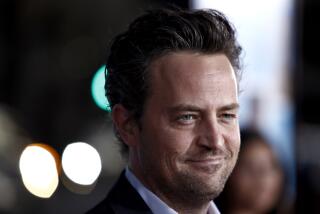Medical Board Seeks Records in Producerâs Death
Eighteen months after the overdose death of Hollywood producer Don Simpson, the state Medical Board on Wednesday subpoenaed records from 15 doctors who treated the late filmmaker, law enforcement sources said.
The agency also subpoenaed a private investigator, a pharmacy owner and more than a dozen other individuals affiliated with Simpson in an effort to compile information about a clandestine drug detoxification program conducted at Simpsonâs Bel-Air estate that ended in August 1995 after a doctor was found dead on the property. The board has the power to revoke a physicianâs license.
Almost immediately after Simpson died--and police discovered thousands of prescription pills and capsules at his home--questions were raised about whether doctors and pharmacies had improperly prescribed drugs to the famous action film producer. His death triggered a federal criminal probe that culminated in a raid last August on the West Los Angeles offices of Simpsonâs psychiatrists, Dr. Nomi J. Fredrick and Dr. Robert H. Gerner.
No action has been taken against either doctor--or against any other physician or pharmacy providing medications to the producer before his death. The federal probe ground to a halt seven months ago after investigators declined to grant immunity to key witnesses who were willing to testify before a grand jury.
Frustrated with the lack of progress in the federal probe, the Medical Board--in conjunction with the state attorney generalâs office--ratcheted up its own investigation six months ago into Simpsonâs death, sources said. The Medical Board subpoenaed the doctors this week after Robert Chapman, a lawyer for Simpsonâs estate, declined to release Simpsonâs records to authorities without a subpoena.
The doctors who received subpoenas are required to turn over records within 15 working days. Certain individuals subpoenaed will also be compelled to testify next month before an investigator from the Medical Board. Information gathered from the records and interviews will be evaluated by a team of Medical Board experts in the months ahead.
If a doctor is determined to have overprescribed drugs, the board could refer the case to the attorney generalâs office and request approval to revoke the doctorâs license. Board investigations do not typically result in criminal prosecutions.
Deputy Atty. Gen. Richard Marino, who is helping the Medical Board coordinate its probe, refused to discuss the case. Representatives for the board and the Drug Enforcement Administration also declined comment.
Fredrick and Gerner did not return calls seeking comment. Fredrickâs attorney, Harland Braun, said his client does not intend to comply with a subpoena served Wednesday by the Medical Board.
Braun said even when subpoenaed, a physician is not required to turn over patient records. âWe are obligated by law to protect the confidentiality of each patientâs file. We will not give up any patientâs file unless we get a ruling that the patient has waived their privilege or that their privilege is overridden by a court,â he said.
Simpson--whose partnership with producer Jerry Bruckheimer yielded such blockbusters as âTop Gun,â âBeverly Hills Copâ and âThe Rockâ--died Jan. 19, 1996, from an overdose of 21 drugs, only one of which was illegal: cocaine.
Records indicate that the thousands of pills found at the producerâs Stone Canyon Road home represented only a fraction of the 15,000 sedatives, amphetamines, tranquilizers, anti-psychotics, narcotics and other drugs provided to him over the previous three years by a network of 15 local doctors and eight pharmacies.
Many of the pills and capsules confiscated from Simpsonâs home last year were prescribed during the summer of 1995 when he hired Dr. Stephen Ammerman to conduct a drug detoxification program at the producerâs home to help him kick an addiction, sources said.
That program, during which Fredrick wrote prescriptions for Simpson under a pseudonym, ended Aug. 15 when Ammerman was found dead in the producerâs pool house. The autopsy report revealed that Ammerman died of a multiple drug overdose, including Valium, cocaine and about four times the lethal limit of morphine.
When Simpson died five months later, agents from the narcotics division of the Los Angeles Police Department, the state Board of Pharmacy and the Medical Board of California began investigating the case. The DEA took the probe away from the state in the spring of 1996 and coordinated the raid.
Last August, dozens of federal agents descended on Fredrickâs Olympic Boulevard office and confiscated computers, patient files, computer discs, documents and vials of prescription drugs. The government has yet to return any of the items confiscated from Fredrickâs office and home.
It has been seven months since federal investigators have contacted Fredrick or anyone connected with the Simpson case. Federal agents did not return calls to former Simpson associates who were willing to testify before a federal grand jury in December, sources said.
âThe Medical Board was perfectly content to wait until the DEA finished their probe,â said one state government source. âBut when it became very clear that the feds werenât going to do any more work on the Simpson case, the Medical Board and the attorney generalâs office decided to put this thing on the front burner.â
More to Read
Sign up for Essential California
The most important California stories and recommendations in your inbox every morning.
You may occasionally receive promotional content from the Los Angeles Times.









